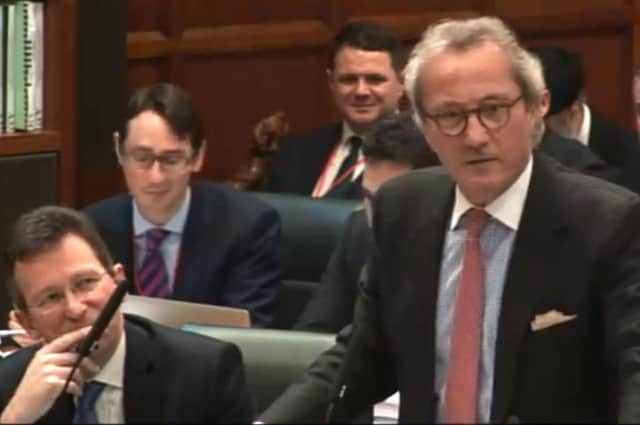Holyrood approval '˜not needed' for Brexit court told


In a legal argument that goes to the heart of the devolution settlement, the UK government’s top Scottish law officer told 11 Supreme Court justices that Westminster can “legislate at any time on any matter” and said the convention requiring it to consult Holyrood is not legally enforceable.
Attorney General for Scotland Lord Keen QC was taking part in a legal case that will decide whether Prime Minister Theresa May can use the royal prerogative to trigger Article 50 of the Lisbon Treaty and start the two-year Brexit process without having to gain parliamentary approval.
Advertisement
Hide AdAdvertisement
Hide AdThe landmark hearing at the UK’s highest court follows a ruling by the High Court in November that ministers had to seek the approval of Westminster.
Scottish ministers are intervening in the case to argue that the Scottish Parliament must also be consulted before Article 50 is triggered.
Lord Keen argued that the Scottish Government’s case was “fatally undermined” because foreign affairs powers, including relations with the European Union, are reserved.
Even in relation to reserved matters, Lord Keen said, “the correct legal position is that Parliament is sovereign, and may legislate at any time on any matter”.
Advertisement
Hide AdAdvertisement
Hide AdHe also argued that a convention that dates to the creation of the Scottish Parliament giving MSPs a say on UK legislation “was never intended to be a justiciable legal principle”.
The then junior Scotland minister Lord Sewel set out the convention that Westminster should not pass legislation that deals with devolved matters without consulting MSPs, using a parliamentary device known as consent motion.
Following the Scottish independence referendum in 2014, the Sewel Convention was included in the 2016 Scotland Act following a recommendation from the Smith Commission that it should be “put on a statutory footing”.
However, Lord Keen yesterday argued the convention was a “political” device that cannot be enforced in law, describing it as a “self denying ordinance” for Westminster.
Advertisement
Hide AdAdvertisement
Hide AdThe arguments drew an angry response from SNP MP Pete Wishart, who tweeted: “There’s your Tory Westminster Scottish law officer saying Scotland shouldn’t have a say on Brexit. Know your place, Scotland.”
Lord Advocate James Wolffe is expected to put forward the Scottish Government’s case today. Arguments will conclude this week, with a ruling not expected until January.
Yesterday, James Eadie QC for the UK government closed his case by rejecting claims that its Brexit strategy was an “affront” to Parliamentary sovereignty.